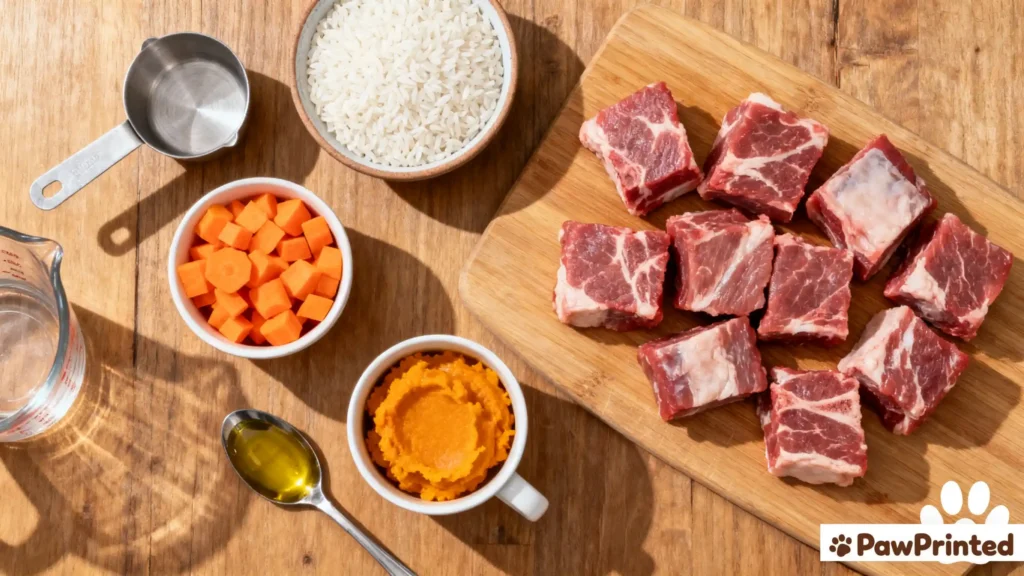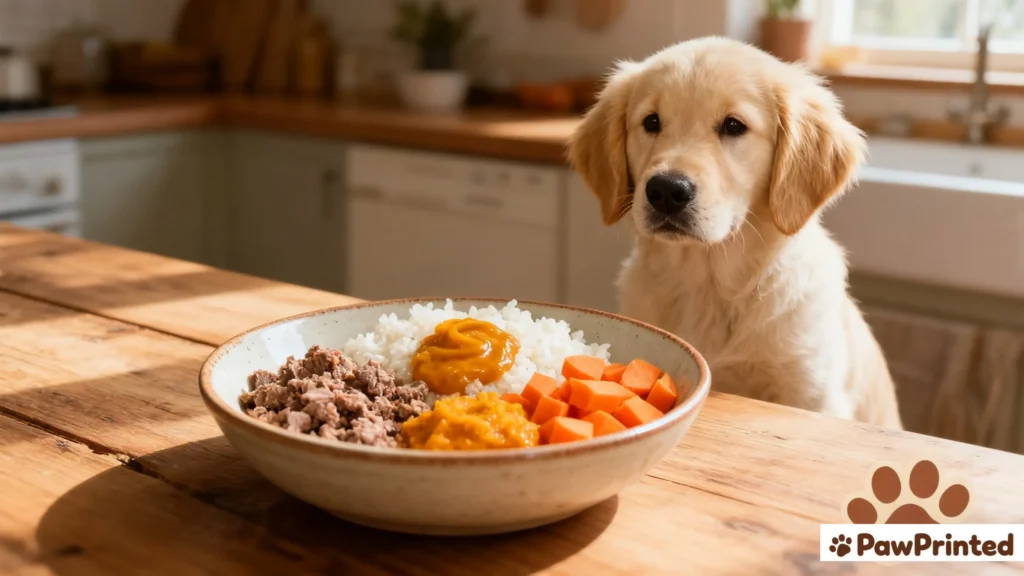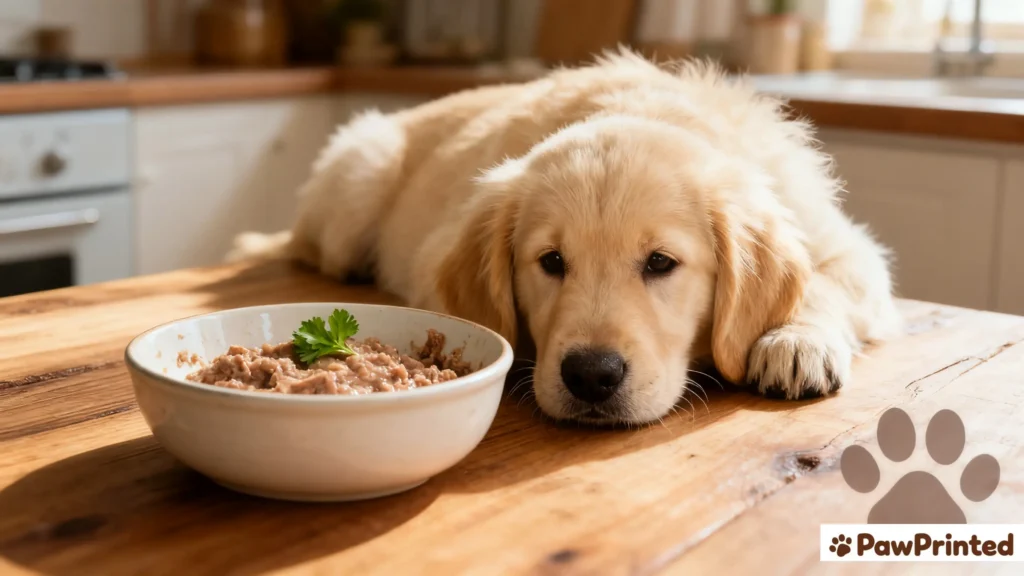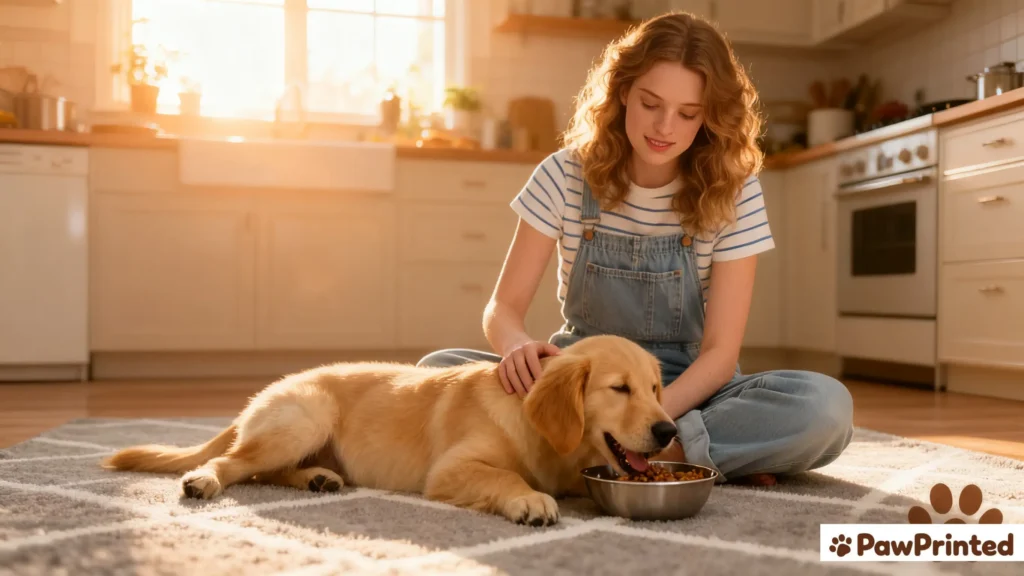When Ethan’s ears went rosy and his paws never got a break from licking, our vet suggested we try a cleaner protein. Chicken kept spinning up little flare-ups, so we moved—slowly—to lamb. Two calm weeks later, stools steadied, the late-night scratching softened, and his coat started catching the light again. This guide sums up what actually worked for us with lamb-based foods, who benefits most, and how to switch without rocking the tummy.

Lamb can be a gentler swap for dogs who struggle with common proteins—especially when you keep the ingredient list short and the transition slow.
⚠️ Call your vet first for persistent vomiting/diarrhea (>24h), blood in stool, hives or facial swelling, weight loss, or extreme lethargy. Diet helps maintenance—not emergencies.
Why Lamb Dog Food Can Help
- High-quality, digestible protein with naturally helpful minerals (iron, zinc) for skin & coat support.
- Great “alt protein” when chicken or beef seem to correlate with itch or soft stools.
- Pairs well with LID (Limited Ingredient Diet) logic—fewer variables = cleaner read on triggers.
If your dog’s main symptom is tummy trouble, start with our hub: Sensitive Stomach & Diarrhea.For skin-first cases, compare guidance in Dog Food for Sensitive Skin.Unsure where to begin? Learn the basics of Limited Ingredient Dog Food and use the Dog Food Transition Guide.

What Worked for Us: Vet-Informed, Story-Based Picks
We didn’t shop a list—we followed Ethan. First, the lamb version of a gentle classic calmed the “bath-night” cycle:
when we switched toHill’s Science Diet Small & Mini Lamb & Rice,tools stayed predictable by the end of week one, and he stopped pacing after dinner.
On days when his skin sounded “loud,” a simpler label helped us read the room:Blue Buffalo Basics LID Lamb & Potato.
Fewer variables meant we could finally tell if the problem was food or just spring pollen. The bonus was a softer, glossier coat after a couple of weeks.
For long runs when we wanted a steady everyday bowl, we rotated inPurina Pro Plan Lamb & Rice (Sensitive Skin & Stomach).It carried the weeks when work got busy—good stool form, easy acceptance, zero drama.
And when we needed a budget-sane, widely available option that still kept to the lamb idea,Nutro Natural Choice Lamb & Brown Rice was our Monday-through-Friday backup. Not flashy—just reliable and kind to his gut.
Quick Comparison
| Option | Why It Helps | Best For |
|---|---|---|
| Hill’s Small & Mini Lamb & Rice | Gentle base; tiny kibble; consistent stools | Small breeds; first lamb trial |
| Blue Basics LID Lamb & Potato | Fewer variables; easier to judge reactions | Allergy suspects; elimination-style weeks |
| Purina Pro Plan Lamb & Rice (Sensitive) | Lamb + prebiotic fiber; coat & tummy support | Daily convenience; picky eaters |
| Nutro Natural Choice Lamb & Brown Rice | Balanced macros; widely available | Budget-sane, steady routine |

Health Notes & Vet Advice
- Good candidates: dogs that react to chicken/beef; mild skin itch; on-off soft stools.
- Use caution / ask vet: known lamb allergy; kidney disease; dogs on prescription diets.
- Switch slowly: follow a 7–10 day transition ladder and log stool/itch for 10–14 days before judging.

FAQ: Lamb Dog Food
Not universally—just often different. Many dogs that react to chicken do calmer on lamb, especially in a LID formula. If symptoms persist, see our Allergies Guide.
It depends on your dog’s history. Lamb can be an excellent “alt protein” when chicken correlates with itch or soft stools. Keep a 10–14-day log after each change.
Yes—pick formulas labeled for growth/All Life Stages and confirm calcium/phosphorus is puppy-appropriate. See our Puppy Dog Food hub.
Not necessarily. Many dogs do well with gentle grains (rice, oats). Weigh the pros/cons in our Grain-Free Guide.
Use a 7–10 day ladder (25% → 50% → 75% → 100%) from our Transition Guide, and change one variable at a time.
Wrapping It Up
Our wins with lamb weren’t dramatic—they were quiet: calmer evenings, better poops, fewer “itch hours.” If you’re testing this path, start simple, hold steady, and let your notes be the judge. And if cooking is your love language, don’t miss the lamb recipe collection above.
Follow PawPrinted On Pinterest
See lamb-based recipes, allergy-friendly shopping lists, and vet-approved switch timelines.
Disclosure: We may earn a small commission from recommended links at no extra cost to you. We only share products we genuinely use or vet-review.

